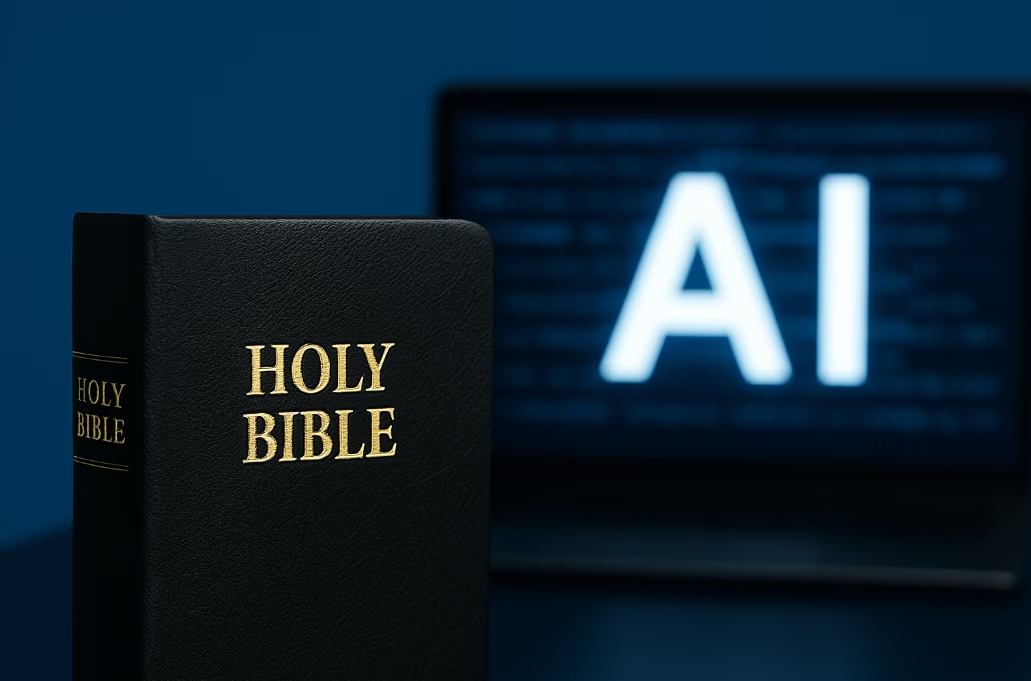
Some pastors and well-meaning Christians are raising a red flag:
“AI-generated content can be manipulated. All it takes is one small change, and Scripture is no longer Scripture.”
As a software engineer and a follower of Christ, I understand the concern—but I also want to gently and truthfully clarify why this fear is largely based on misunderstanding. Let’s unpack this together: not with speculation, but with facts, faith, and technical understanding.
First, What Is AI (LLM) and How Does It Actually Work?
AI tools like ChatGPT are powered by what’s called an LLM—a Large Language Model. Think of an LLM as a very advanced auto-complete engine. Just like when you type on your phone and it guesses your next word, this tool guesses the next word based on what it learned from reading billions of documents, including websites, books, articles, and yes—Bible texts.
What Does It Actually Read?
It doesn’t “think” or invent things on its own. It learns patterns from:
-
Public web pages (like BibleGateway.com, Blue Letter Bible, KingJamesBibleOnline.org)
-
Digitized public domain books (such as the King James Version, which is in the public domain)
-
Content that was included in its training data (for example, Wikipedia or theology forums)
Important: The AI doesn’t “change” Scripture. It pulls what it has seen online. If the online version was accurate, the AI will repeat it accurately.
AI is Not the Source of Truth — It Mirrors It
Let’s be clear: AI is not an authority on Scripture. It’s a mirror. If a user prompts it to give a verse from the NIV or KJV, it returns what it has “seen” in its training from those versions.
So, Can It Make Mistakes?
Yes—but only if the user prompts it incorrectly or asks for a paraphrase. That’s no different from when a person misquotes Scripture, whether in a sermon, podcast, or blog.
The truth is:
-
If I ask AI: “Quote John 3:16 from the King James Version”, it accurately returns the text.
-
If I ask: “Paraphrase John 3:16”, then yes, the language changes—but that’s not a failure of the AI, it’s just doing what was asked.
So we must separate two things:
-
Quoting the Bible Accurate (when asked clearly)
-
Summarizing or rephrasing May change meaning, and should be done with discernment (just like a human teacher would)
Test it
If you don’t believe me well test Chat GPT for yourselves to draw your own conclusion. Here is a prompt that I asked the AI Bible chat in Chat GPT how it works. You can see it’s response here.
If you are a techy like me, here is some more information straight from the founders of Chat GPT (Open AI) on how exactly Chat GPT works and get’s it’s information. As they mention :
“We do not intentionally gather data from sources known to be behind paywalls or from the dark web. Additionally, we apply filters to remove material we do not want our models to learn from, such as hate speech, adult content, sites that aggregate personal information, and spam. The remaining information is then used to train our models.”
From a Software Engineer’s View: AI is Like Google, Not a Prophet
Here’s a simple analogy:
AI is like Google Search, but it gives the result in sentence form instead of links.
You wouldn’t accuse Google of “changing the Bible” just because it shows Bible verses when you search. In the same way, AI is simply accessing data it has seen in the same places you already trust—online Bibles, public theology texts, etc.
If you don’t distrust your online Bible, there’s no reason to distrust AI quoting from it.
A Biblical Response to the Fear
Let’s also examine the spiritual side. Yes, we must always be cautious and discerning. Scripture warns:
“Test everything. Hold on to what is good.” — 1 Thessalonians 5:21 (NIV)
That applies to human teachers, books, YouTube preachers, and yes—even AI tools. But discernment is not the same as fear.
Fear says:
“Never use this because it could go wrong.”
Discernment says:
“Use this wisely and double-check its fruit.”
AI is a tool, not a teacher. The Holy Spirit is your teacher.
AI can assist, but your Bible, your prayer life, your community of believers, and your study of the Word are the real foundation.
Conclusion: Why AI is Not a Threat to the Bible
Here’s the truth, simply put:
-
AI doesn’t invent Scripture—it reflects what’s already published.
-
It can quote Bible verses accurately when asked clearly, just like any Bible app.
-
Misuse comes from poor input, not from the tool itself—just like any sermon can misquote the Bible if not done carefully.
-
You remain responsible for discernment, not the tool.
We should absolutely use caution—but we must also use wisdom, not fear.
Final Thought
At Christ Reigns Media, we do not claim to be Bible scholars. We’re just believers using every tool we can—including AI—to spread the gospel, create songs, encourage others, and glorify Jesus Christ.
We always check our Bible quotes. We always point back to God’s Word. And if there’s ever a mistake—we fix it, just like any human would.
So no, AI is not rewriting the Bible. It’s reflecting what it’s been trained on—and with proper use, that can be a powerful way to amplify the message of Jesus Christ.
Related
Discover more from Christ Reigns Media
Subscribe to get the latest posts sent to your email.
